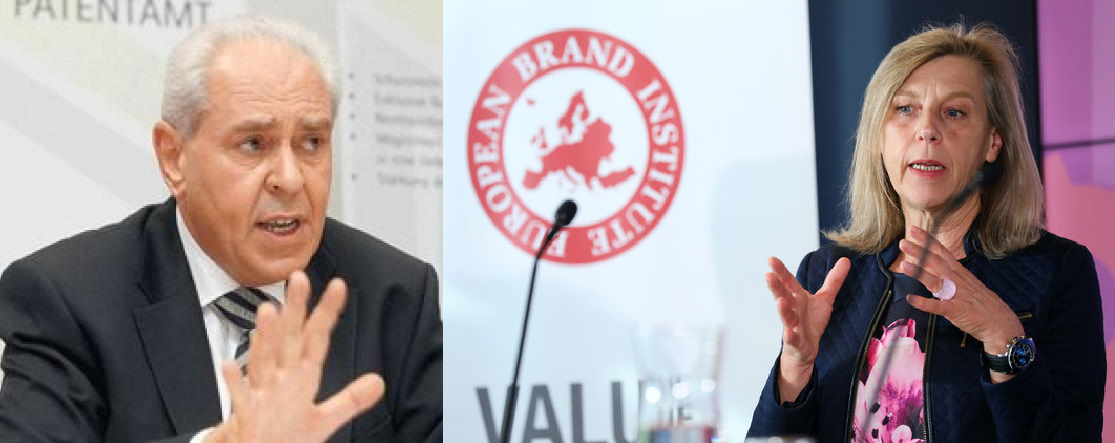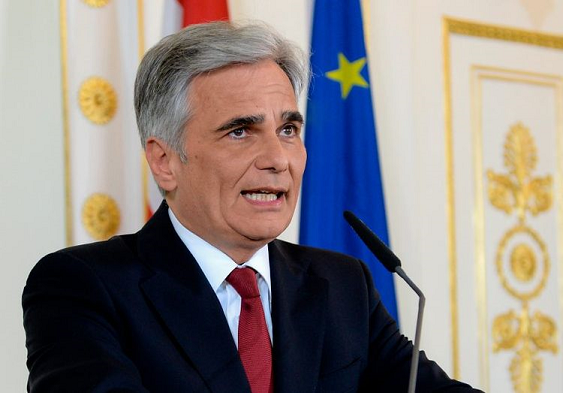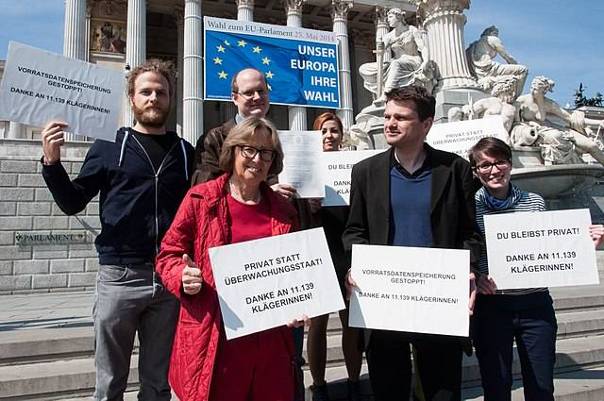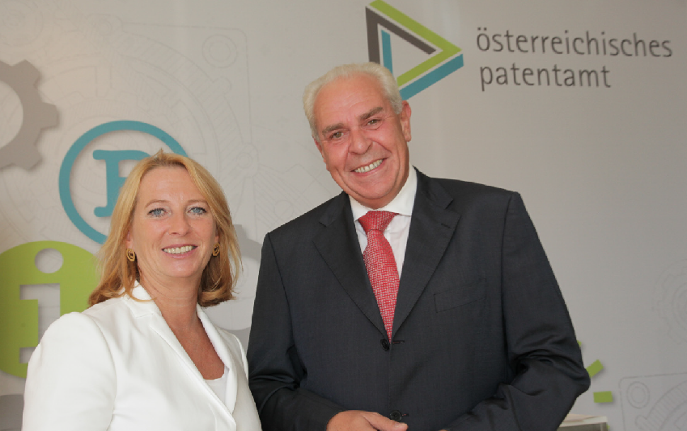

The Austrian delegation: Friedrich Rödler and his deputy Andrea Scheichl.
The Federal Republic of Austria is not a founding state of the EPO but it nevertheless plays a significant role in the organisation's affairs due to the fact that it is the third host state. There is a small EPO sub-office located in Vienna (warning: epo.org link) which employs 87 staff and is mainly concerned with patent information and publication services.
"There is a small EPO sub-office located in Vienna which employs 87 staff and is mainly concerned with patent information and publication services."In this part we will take a closer look at the delegation representing Austria on the EPO's Administrative Council in June 2013. At that time, the delegation was headed by the Director of the Austrian Patent Office, Friedrich Rödler, who was assisted by his deputy, Andrea Scheichl.
Rödler's escapades during his time as Director of the Austrian IPO between 2005 and 2015 made the headlines in his home country and will be treated to an in-depth exposé here.
"Rödler's escapades during his time as Director of the Austrian IPO between 2005 and 2015 made the headlines in his home country and will be treated to an in-depth exposé here."Rödler never quite managed to make the grade as an "alpha male" silverback in the pecking order of the EPO's Administrative Council, although he may well have had ambitions in that direction.
But back on his home turf in Vienna, he was permitted to run the show at the Austrian Patent Office without any effective ministerial oversight or control until he finally ran out of luck in 2015 as a result of his own hubris and greed.
The civil service in Austria is extremely "politicised" - in the sense that senior civil servants are typically card carrying members of a particular political party.
Rödler is a member of the Austrian FPÃâ which was founded by Jörg Haider. This party presents itself as residing in the political "centre" but it is more generally perceived as "right-wing populist" and "national-conservative".
Rödler was an unsuccessful candidate for the FPÃâ in the Vienna regional elections in 2005 and 2015. He is also reputed to be connected to Masonic circles in Austria associated with the former FPÃâ finance minister Karl-Heinz Grasser who was jailed for corruption in 2020.
"The civil service in Austria is extremely "politicised" - in the sense that senior civil servants are typically card carrying members of a particular political party."Rödler's appointment as Director of the Austrian Patent Office followed an amendment to the Patent Act at the end of 2004 under Minister Hubert Gorbach (FPÃâ). This amendment removed a previous restriction according to which only academically qualified staff members of the Patent Office were eligible to apply for the position of Director.
At the time of its adoption, the amendment was strongly criticised by opposition parties in Austria. In particular, it was criticised for opening the door to purely political appointments at the senior management level of the Patent Office.
Rödler's subsequent appointment as Director of the Patent Office in 2005 showed that these fears were entirely justified.
Indeed, it's no exaggeration to say that his ten-year tenure at the head of the Austrian Patent Office - from 2005 to 2015 - was continuously dogged by political controversy.
"The President of the EPO - Alain Pompidou - responded by stating that Rödler's comments were "misleading in substance" and had been made in an inappropriate manner."In 2007, Rödler launched his own private vendetta against the European Patent Office (EPO) and its staff when he issued a press release [PDF] complaining that he was "severely disappointed by the performance of the EPO" and claiming that he found "the discrepancy between salary level and output [of patent examiners] increasingly incomprehensible".
The President of the EPO - Alain Pompidou - responded by stating that Rödler's comments were "misleading in substance" and had been made in an inappropriate manner.
Rödler was not deterred and continued to draft further dispatches in a similar tone.
In the end, his supervising minister - at the time, Werner Faymann of the SPÃâ – was obliged to intervene and apologise officially to the EPO and its staff. Faymann wrote that "Austria very much appreciates the EPO's work" and he assured that he would "take care of an improved communication structure."

The minister responsible for the Austrian Patent Office, Werner Faymann, felt obliged to publicly apologise for Rödler's "misleading" and "inappropriate" attacks on EPO staff in 2007.
"Even this intervention by his supervising minister wasn't enough to stop Rödler who continued to issue misleading statements about a purported "debt quagmire" at the EPO."Given his deeply entrenched hostility towards EPO staff, it's unlikely that Rödler had any qualms about supporting Battistelli's "Strike Regulations" in June 2013. And it seems equally improbable that his submissive deputy Andrea Scheichl dared to express any contrary opinion on the matter.
However, by a curious twist of irony, just as Rödler was voting to trample on the rights of EPO staff in June 2013 he was becoming embroiled in what the Austrian media called an "embarrassing farce" back home in Vienna.
This affair revolved around a "second salary" which Rödler received in addition to his regular remuneration as head of the Patent Office and it would lead to his downfall in due course.
"This affair revolved around a "second salary" which Rödler received in addition to his regular remuneration as head of the Patent Office and it would lead to his downfall in due course."To fully understand what was going on here it is worthwhile conducting a detailed review of Rödler's career at the Austrian Patent Office starting with his appointment as Director in 2005.
At the time in question, Rödler was a senior civil servant holding the position of Secretary-General at the Patent Office's supervising Ministry (Bundesministerium für Verkehr, Innovation und Technologie - BMVIT).
Right from the word go, Gabriela Moser - an Austrian MP from the Green Party - was on Rödler's case with a parliamentary question about the circumstances of his appointment to the top job at the Patent Office.
As a matter of fact, during the period between 2005 and 2016, Moser submitted no less than four parliamentary questions about Rödler and his activities in connection with the Austrian Patent Office.
"As a matter of fact, during the period between 2005 and 2016, Moser submitted no less than four parliamentary questions about Rödler and his activities in connection with the Austrian Patent Office."In the first parliamentary question submitted in February 2005 [PDF], Moser referred to various suspected irregularities which occurred on Rödler's watch as BMVIT Secretary-General. These suspected irregularities included inconsistencies in the award of public contracts connected with the relocation of the Patent Office from the city centre to an outlying suburb of Vienna.
Moser also referred to Rödler's exceptionally well-endowed special contract as Secretary-General and she criticised the 2004 amendment of the Patent Act, which removed previous restrictions on prospective candidates for the position of Patent Office Director. According to Moser, the amendment was specifically tailored to permit Rödler to be installed into the top job by his political sponsors.

Rödler's nemesis, the late Gabriela Moser of the Austrian Green Party (front left), protesting against legislative plans to increase state surveillance.
[PDF] about his management style and his controversial track record as head of the Patent Office since 2005.
"More specifically, there were allegations of "intimidation" by Rödler, including unjustified disciplinary procedures against staff - in one case a private lawsuit against a staff member - and harassment of staff representatives, in particular one who had given support to an employee targeted by Rödler."Amongst other things, Moser accused Rödler of stoking conflicts with the EPO and of an excessively confrontational management style at the Austrian Patent Office.
More specifically, there were allegations of "intimidation" by Rödler, including unjustified disciplinary procedures against staff - in one case a private lawsuit against a staff member - and harassment of staff representatives, in particular one who had given support to an employee targeted by Rödler.
In addition to this, questions were asked about Rödler's involvement with serv.ip, a partially autonomous unit of the Patent Office which had been set up to provide "IP information services" on a commercial basis, apparently without a proper legal basis.
"In all of these cases Rödler was found to have acted in a manner that was "not in accordance with the law"."The issues raised in Moser's second parliamentary question were taken up in an article published [PDF] in the Austrian newspaper Die Presse under the title "Friedrich Rödler: The Stern Master of the Patent Office".
In this newspaper article it was reported that the Staff Representation Supervisory Commission of the Austrian Federal Chancellery had investigated six complaints against Rödler in 2007.
In all of these cases Rödler was found to have acted in a manner that was "not in accordance with the law".
However, despite the extensive allegations of misconduct against Rödler, the Minister in charge of the BMVIT, Doris Bures, was not deterred from renewing his appointment for another five years in 2010.

Rödler with Minister Doris Bures who renewed his appointment in 2010 before his "second salary" from serv.ip became a matter of public controversy.
"As we shall see in due course, Bures probably lived to regret her decision."A few years later in 2013, Rödler was back in the headlines again. This time the renewed public scrutiny was linked to his role as "managing director" of serv.ip and, more specifically, to a second salary which he had awarded himself in this capacity.
In the next part we will see how this very public controversy eventually led to Rödler's downfall in 2015. ⬆